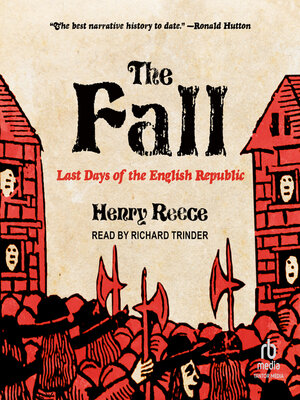
Sign up to save your library
With an OverDrive account, you can save your favorite libraries for at-a-glance information about availability. Find out more about OverDrive accounts.
Find this title in Libby, the library reading app by OverDrive.



Search for a digital library with this title
Title found at these libraries:
| Library Name | Distance |
|---|---|
| Loading... |
Why did England's one experiment in republican rule fail?
Oliver Cromwell's death in 1658 sparked a period of unrivaled turmoil and confusion in English history. In less than two years, there were close to ten changes of government; rival armies of Englishmen faced each other across the Scottish border; and the Long Parliament was finally dissolved after two decades. Why was this period so turbulent, and why did the republic, backed by a formidable standing army, come crashing down in such spectacular fashion?
In this fascinating history, Henry Reece explores the full story of the English republic's downfall. Questioning the accepted version of events, Reece argues that the restoration of the monarchy was far from inevitable—and that the republican regime could have survived long term. Richard Cromwell's Protectorate had deep roots in the political nation, the Rump Parliament mobilized its supporters impressively, and the country showed little interest in returning to the old order until the republic had collapsed. This is a compelling account that transforms our understanding of England's short-lived period of republican rule.
Oliver Cromwell's death in 1658 sparked a period of unrivaled turmoil and confusion in English history. In less than two years, there were close to ten changes of government; rival armies of Englishmen faced each other across the Scottish border; and the Long Parliament was finally dissolved after two decades. Why was this period so turbulent, and why did the republic, backed by a formidable standing army, come crashing down in such spectacular fashion?
In this fascinating history, Henry Reece explores the full story of the English republic's downfall. Questioning the accepted version of events, Reece argues that the restoration of the monarchy was far from inevitable—and that the republican regime could have survived long term. Richard Cromwell's Protectorate had deep roots in the political nation, the Rump Parliament mobilized its supporters impressively, and the country showed little interest in returning to the old order until the republic had collapsed. This is a compelling account that transforms our understanding of England's short-lived period of republican rule.







